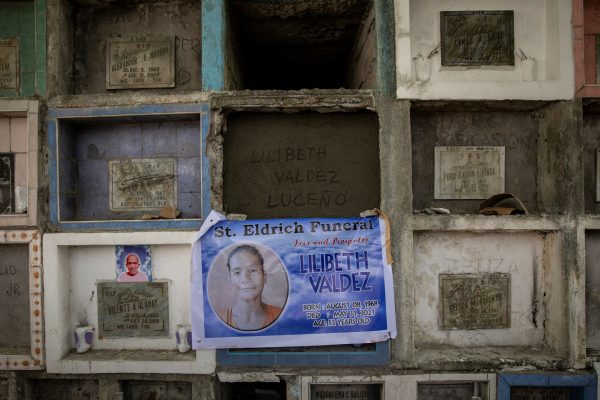Aside from implementing Duterte’s brutal war on drugs, the Philippine National Police (PNP) also plays a crucial role in government’s management of the COVID-19 pandemic. The police have also been instrumentalised to expand presidential powers and consolidate an illiberal regime. Amid the pandemic, the PNP deployed excessive force against protesters and marginalised communities and was ordered by Duterte to shoot down troublemakers. The number of attacks both by unidentified assailants and the state’s security forces, as elucidated by Human Rights Watch, have increased during the pandemic.
Recently, the police have been red-tagging — blacklisting groups by labelling them as communists — ‘community pantries’ that help disadvantaged individuals obtain food. Police units have allegedly been patrolling food banks and are linking organisers to the communist movement, putting their lives at risk. While Sinas denied the existence of orders from national headquarters to monitor and profile community pantries, it is difficult to take his words at face value.
In today’s age of social media, the PNP have also weaponised digital platforms to vilify the media and spread fear and misinformation regarding protesters, public figures and opposition politicians. With the contentious Anti-Terrorism Act of 2020 also in effect, the PNP’s newly appointed head will definitely have much to manage.
Some contend that Eleazar may benefit from replacing an unpopular police chief. Before assuming the top post, Sinas was infamous for his birthday celebrations at the height of COVID-19 lockdown restrictions. As the then-police chief of the National Capital Region (NCR), Sinas held a crowded feast on 8 May 2020 inside the NCR police headquarters. Netizens created satirical memes to express their outrage at the ill-considered birthday bash.
Despite the blatant flouting of pandemic restrictions, the then-PNP chief General Archie Gamboa defended Sinas from the slew of criticisms and claimed that it was not a party but only a mañanita, a breakfast serenade. He also asserted that Sinas would remain as NCR police chief as he was ‘hard to replace’. Duterte went on to clear Sinas of any violations and eventually appointed him in the institution’s highest position six months later.
Such responses by top government officials were disappointing but unsurprising. After all, the socio-political landscape of the Philippines has long been beset by a culture of impunity. Wrongdoers are rewarded instead of being investigated and lawfully prosecuted if they are authority figures or an affiliate of such figures.
Eleazar will not only need to administer law and order but also effectuate policies to improve the besmirched reputation of the PNP and reduce the institutional ills that are plaguing the 220,000-strong police force. Addressing public concerns about the new anti-terrorism law, ending the bloody drug war and dangerous red-tagging activities, upgrading the PNP’s organisational capacities against non-traditional threats and holding delinquent officers accountable should be high on Eleazar’s to-do list. The actualisation of these duties may be challenging considering the nature of the Duterte regime, where the PNP is primarily mobilised to elevate ‘order over law’ and serve as ‘willing executioners for the president’.
Still, Eleazar should be no stranger to immense responsibilities as the former commander of the Joint Task Force COVID-19 Shield and a cum laude graduate of the Philippine Military Academy with experience in combat operations against communist rebels. While he will only be in the position for six months (he will be 56 years old on 13 November), he can still initiate innovative and long-term policies to help the PNP live up to its maxim of serving and protecting the people.
Prior leadership changes at the top failed to produce substantial reforms due to the organisation’s deeply rooted ills. It will take determination and stamina to achieve institutional change, but Eleazar should consider his appointment as an opportunity to lead the PNP at this critical juncture.
During the Change of Command ceremonies on 7 May, Eleazar fired a strong salvo by declaring that during his tenure as police chief ‘every single centavo of your hard-earned money allocated to us will be in good hands. To the remaining hoodlums in police uniforms, I will make sure that you will hate me’. If Eleazar makes good on his promise and uses his chance in this position to its full potential, then the people of the Philippines may have more than a dubious mañanita to celebrate.
Kevin Nielsen M Agojo is Assistant Professorial Lecturer in the Political Science Department at De La Salle University, Manila.

